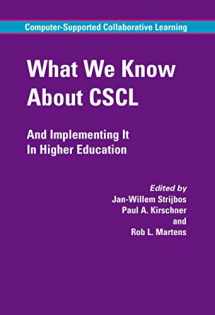
What We Know About CSCL: And Implementing It In Higher Education (Computer-Supported Collaborative Learning Series, 3)
ISBN-13:
9781402077791
ISBN-10:
1402077793
Edition:
2004
Author:
Paul A. Kirschner, Jan-Willem Strijbos, Rob L. Martens
Publication date:
2004
Publisher:
Springer
Format:
Hardcover
280 pages
FREE US shipping
Book details
ISBN-13:
9781402077791
ISBN-10:
1402077793
Edition:
2004
Author:
Paul A. Kirschner, Jan-Willem Strijbos, Rob L. Martens
Publication date:
2004
Publisher:
Springer
Format:
Hardcover
280 pages
Summary
What We Know About CSCL: And Implementing It In Higher Education (Computer-Supported Collaborative Learning Series, 3) (ISBN-13: 9781402077791 and ISBN-10: 1402077793), written by authors
Paul A. Kirschner, Jan-Willem Strijbos, Rob L. Martens, was published by Springer in 2004.
With an overall rating of 3.7 stars, it's a notable title among other
Education & Reference
(Computer Science, User Experience & Usability, Web Development & Design, Higher & Continuing Education) books. You can easily purchase or rent What We Know About CSCL: And Implementing It In Higher Education (Computer-Supported Collaborative Learning Series, 3) (Hardcover) from BooksRun,
along with many other new and used
Education & Reference
books
and textbooks.
And, if you're looking to sell your copy, our current buyback offer is $0.54.
Description
A Dutch policy scientist once said the information and knowledge in the twenty-first century has the shelf life of fresh fish, and learning in this age often means learning where and how to find something and how to relate it to a specific situation instead of knowing everything one needs to know. On top of this, the world has become so highly interconnected that we have come to realise that every decision that we make can have repercussions somewhere else. To touch as many bases as possible, we need to work with knowledgeable others from different fields (multiple agents) and take heed of their points of view (multiple representations). To do this, we make increasing use of computers and computer-mediated communication. If computer-supported collaborative learning (CSCL) is not simply a newly discovered hype in education, what is it and why are we writing a book about it? Dissecting the phrase into its constituent parts, we see that first of all CSCL is about learning, and in the twenty-first century this usually means constructivist learning.


We would LOVE it if you could help us and other readers by reviewing the book
Book review

Congratulations! We have received your book review.
{user}
{createdAt}
by {truncated_author}


